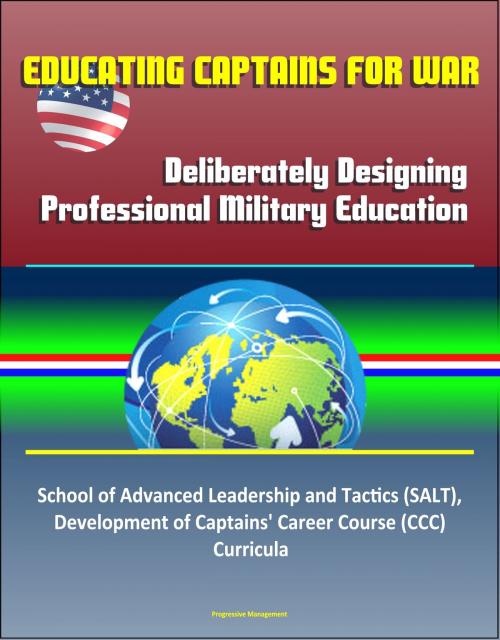Educating Captains for War: Deliberately Designing Professional Military Education - School of Advanced Leadership and Tactics (SALT), Development of Captains' Career Course (CCC) Curricula
Nonfiction, History, Military, United States| Author: | Progressive Management | ISBN: | 9781370429257 |
| Publisher: | Progressive Management | Publication: | March 2, 2017 |
| Imprint: | Smashwords Edition | Language: | English |
| Author: | Progressive Management |
| ISBN: | 9781370429257 |
| Publisher: | Progressive Management |
| Publication: | March 2, 2017 |
| Imprint: | Smashwords Edition |
| Language: | English |
This excellent report has been professionally converted for accurate flowing-text e-book format reproduction. This monograph focuses on the recently established School of Advanced Leadership and Tactics' (SALT) development of Captains' Career Course (CCC) Curricula. Many researchers and scholars have written on the subject of education and offered insights on how to improve curricula based on various research methods. However, unlike previous monographs and theses, the focus of this monograph is less on the curricula and more on how the curricula were developed. Did the SALT deliberately and sufficiently develop current CCC curricula to enable captains to meet the demands of complex operating environments? By providing historical context on the development of Professional Military Education (PME) for captains and examining the process the SALT underwent to design current CCC curricula, this monograph argues that the SALT used a deliberate design process and has significantly improved the quality and efficacy of captains' PME in preparing them to meet the demands of complex operating environments.
As attested by the numerous studies focused on Professional Military Education (PME) throughout the years since its inception, the US Army has long been interested in educating its officers to meet the demands of war. A decade of conflict in Afghanistan and Iraq, without a decisive victory, spurred the most recent bout of introspection. Following the 2010 Captains' Career Course (CCC) Study, TRADOC established the School of Advanced Leadership and Tactics (SALT) to provide oversight and governance of all mid-grade officer education from Officer Basic Course (OBC) through the CCC. CCC, in particular, remains a critical component of a company grade officer's growth, though not considered a transitional period for captains between tactical, operational, and strategic levels of war. SALT carries a heavy responsibility in ensuring that CCC's design not only adequately prepares company grade officers for company command and service on battalion and brigade staffs, but also ensures they are ready to transition to the field grade level of their careers.
This excellent report has been professionally converted for accurate flowing-text e-book format reproduction. This monograph focuses on the recently established School of Advanced Leadership and Tactics' (SALT) development of Captains' Career Course (CCC) Curricula. Many researchers and scholars have written on the subject of education and offered insights on how to improve curricula based on various research methods. However, unlike previous monographs and theses, the focus of this monograph is less on the curricula and more on how the curricula were developed. Did the SALT deliberately and sufficiently develop current CCC curricula to enable captains to meet the demands of complex operating environments? By providing historical context on the development of Professional Military Education (PME) for captains and examining the process the SALT underwent to design current CCC curricula, this monograph argues that the SALT used a deliberate design process and has significantly improved the quality and efficacy of captains' PME in preparing them to meet the demands of complex operating environments.
As attested by the numerous studies focused on Professional Military Education (PME) throughout the years since its inception, the US Army has long been interested in educating its officers to meet the demands of war. A decade of conflict in Afghanistan and Iraq, without a decisive victory, spurred the most recent bout of introspection. Following the 2010 Captains' Career Course (CCC) Study, TRADOC established the School of Advanced Leadership and Tactics (SALT) to provide oversight and governance of all mid-grade officer education from Officer Basic Course (OBC) through the CCC. CCC, in particular, remains a critical component of a company grade officer's growth, though not considered a transitional period for captains between tactical, operational, and strategic levels of war. SALT carries a heavy responsibility in ensuring that CCC's design not only adequately prepares company grade officers for company command and service on battalion and brigade staffs, but also ensures they are ready to transition to the field grade level of their careers.















